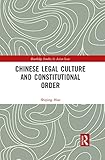Chinese legal culture and constitutional order / Shiping Hua.
Material type: TextSeries: Publisher: Abingdon, Oxon ; New York, NY : Routledge, 2019Copyright date: ©2019Description: 1 online resourceContent type: text Media type: computer Carrier type: online resourceISBN: 9780429203688; 0429203683; 9780429515538; 0429515537; 9780429518966; 042951896X; 9780429512100; 0429512104Subject(s): Constitutional history -- China | Law reform -- China | Constitutional law -- China -- Foreign influences | LAW / Constitutional | LAW / Public | LAW / International | LAW / Legal HistoryDDC classification: 342.5102/9 LOC classification: KNQ2050 | .H83 2019Online resources: Taylor & Francis | OCLC metadata license agreement
TextSeries: Publisher: Abingdon, Oxon ; New York, NY : Routledge, 2019Copyright date: ©2019Description: 1 online resourceContent type: text Media type: computer Carrier type: online resourceISBN: 9780429203688; 0429203683; 9780429515538; 0429515537; 9780429518966; 042951896X; 9780429512100; 0429512104Subject(s): Constitutional history -- China | Law reform -- China | Constitutional law -- China -- Foreign influences | LAW / Constitutional | LAW / Public | LAW / International | LAW / Legal HistoryDDC classification: 342.5102/9 LOC classification: KNQ2050 | .H83 2019Online resources: Taylor & Francis | OCLC metadata license agreement Introduction : issues and questions -- Law and culture: theory and method -- Law in the Chinese cultural tradition -- The late Qing constitutional reform : modernization first, democracy second -- The Republic of China constitutional reform : the Anglo-American model modified -- The early PRC constitutional reform : the Soviet model at a different stage -- The Maoist constitutional reform : governance without laws -- The Dengist constitutional reform : the 1954 constitution modified -- The four amendments : liberalization with limits -- The epilogue : recent events and interpreting China's strive for a constitutional order.
This book examines China's striving for a constitutional order in the 20th century from comparative, historical, and theoretical perspectives. Through a comprehensive study of six major constitutional reforms experienced by China in the last century, Shiping Hua explores pragmatism, instrumentalism, statism, and favoritism as the key features of the Chinese legal culture. Demonstrating that these characteristics have roots in China's ancient past and coincide with modern communist legal theory, it argues that Chinese legal culture has greatly impacted upon the country's move to modernize its legal system. By analyzing key constitutional periods in China's history, this book also evaluates patterns that can be used to better comprehend not only China's present legal reform but its future legal developments too. As the first book to examine how the Chinese legal culture has affected constitutional reform in the 20th century, Chinese Legal Culture and Constitutional Order will be useful to students and scholars of Asian and constitutional law, as well as Chinese Studies more generally.
OCLC-licensed vendor bibliographic record.

